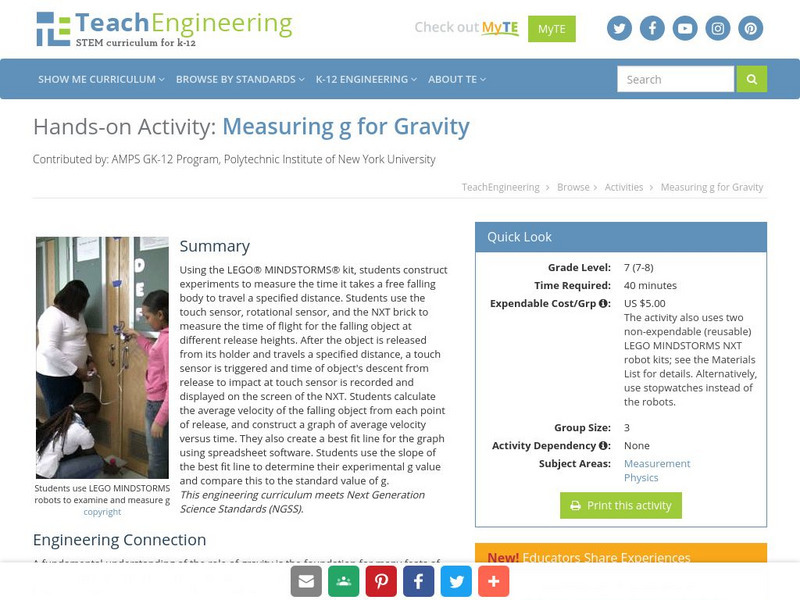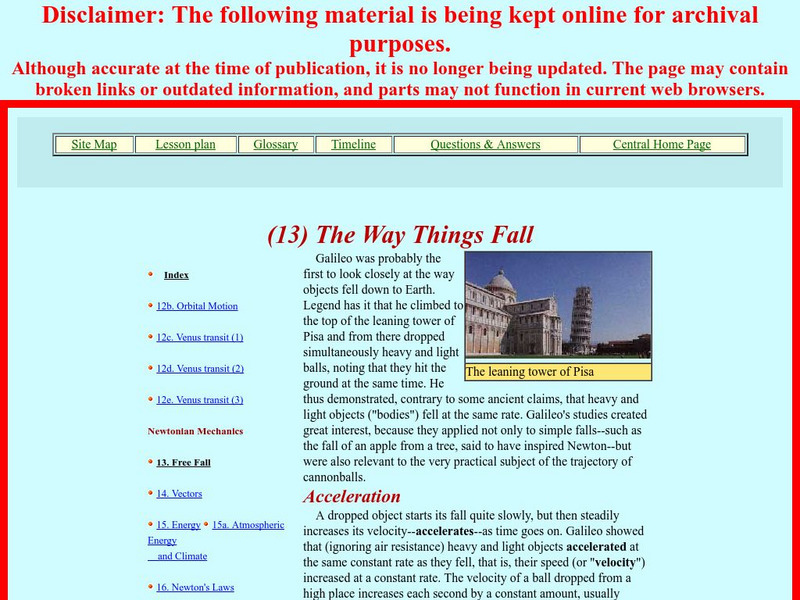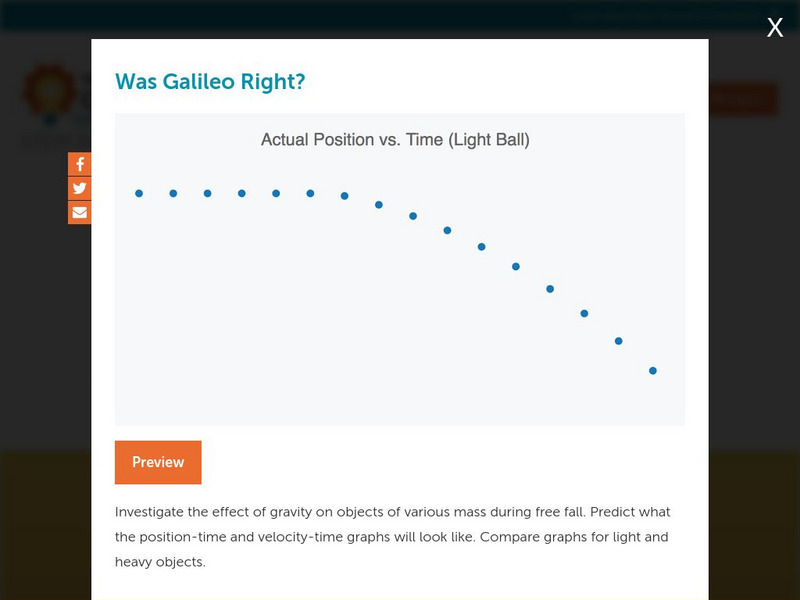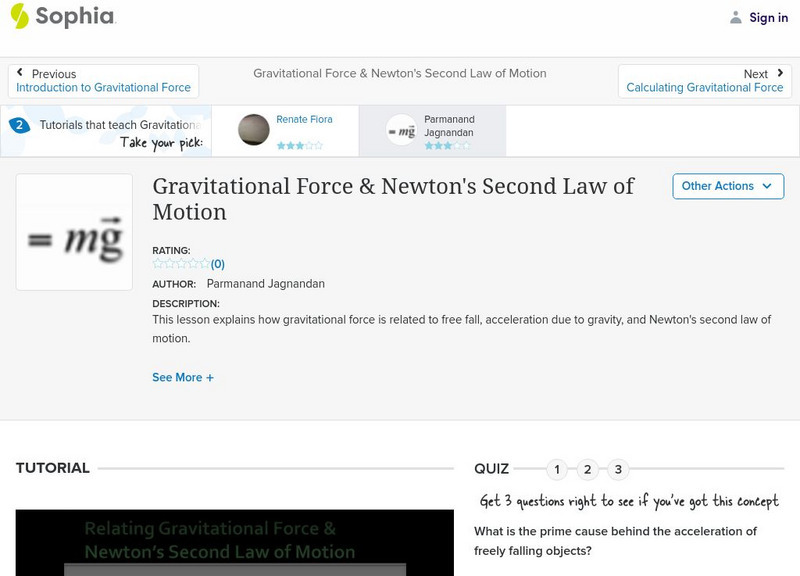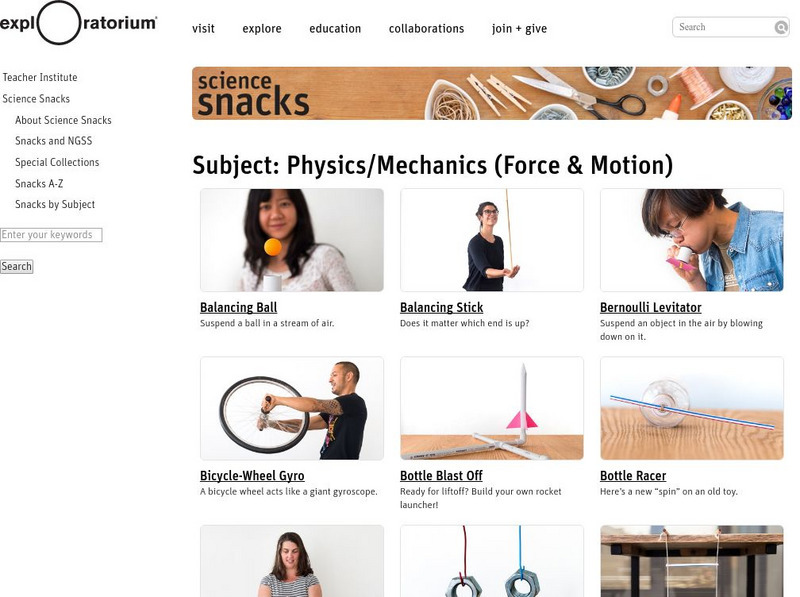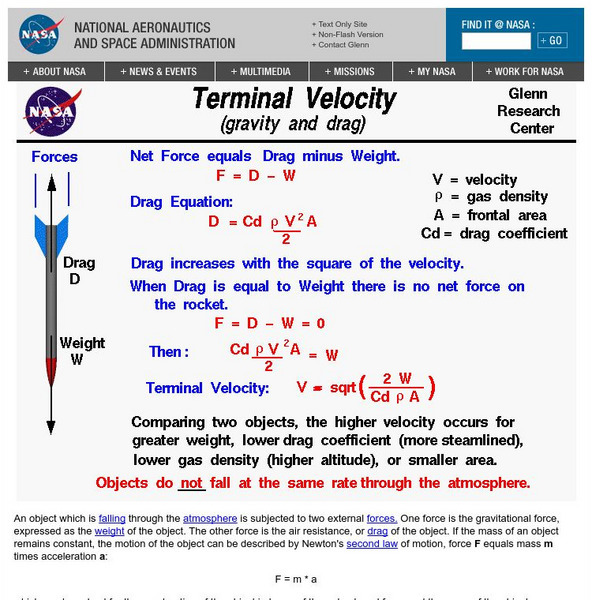NOAA
Noaa: Free Fall Determination of Newtonian Constant of Gravity
Descriptions of an experiment performed by geologists to determine the Newtonian constant of gravity, or "G". Highly sophisticated reading.
OpenStax
Open Stax: Falling Objects
In the following interactive module, students will describe the effects of gravity on objects in motion. They will also describe the motion of objects that are in freefall and calculate the position and velocity of objects in freefall.
Annenberg Foundation
Annenberg Learner: Amusement Park Physics: The Principles of Free Fall
An article describing free fall principles in roller coaster rides. In addition to the explanation of free fall, an experiment is described that allows you to test free fall with a cup of water. Part of a larger presentation on roller...
TeachEngineering
Teach Engineering: Measuring G
Using the LEGO MINDSTORMS NXT kit, students construct experiments to measure the time it takes a free falling body to travel a specified distance. Students use the touch sensor, rotational sensor, and the NXT brick to measure the time of...
Vision Learning
Visionlearning: An Experiment: Acceleration During Free Fall
Animated simulation re-enacts Galileo's experiment of dropping objects off the Leaning Tower of Pisa.
Department of Defense
Do Dea: Free Fall Constants for Earth
When you work with equations that show position, velocity, acceleration of objects that are flying or falling through the air, you will be using the constant that is the acceleration due to gravity. View formulas, explanations, and...
CK-12 Foundation
Ck 12: Physical Science: Acceleration Due to Gravity
[Free Registration/Login may be required to access all resource tools.] Acceleration due to gravity and why falling objects with different masses accelerate at the same rate.
NASA
Nasa: The Way Things Fall
This site from NASA compares free falling motion to falling with air resistance. Discusses Galileo's experiment. Explains why we believe all objects free fall with the same acceleration.
Physics Classroom
The Physics Classroom: 1 D Kinematics: Acceleration of Gravity
The practice problems and illustrated examples in this tutorial help students understand the acceleration of gravity. The 'Value of g' widget the tutorial refers to can be found in the Interactives section (link is in side-bar) under...
Physics Classroom
The Physics Classroom: 1 D Kinematics: How Fast? And How Far?
Students understand the physics of a free falling object through these illustrated example problems.
Concord Consortium
Concord Consortium: Was Galileo Right?
Investigate the effect of gravity on objects of various mass during free fall. Predict what the position-time and velocity-time graphs will look like. Compare graphs for light and heavy objects.
CK-12 Foundation
Ck 12 Exploration Series: Simulations: Physics: Cliff Diver
[Free Registration/Login Required] Learn about the relationship between position and velocity for a diver accelerating under the influence of gravity and air resistance. Measure velocity and position based on variables of the height of...
Department of Defense
Do Dea: Working With Parabolic Projectile Paths
Using the free-fall constants and gravity acceleration equations, we can determine many things about the position, velocity, and speed of a projectile. Here are a few examples and explanations. This is a great review for the AP Calculus...
Sophia Learning
Sophia: Gravitational Force & Newton's Second Law of Motion
This lesson explains how gravitational force is related to free fall, acceleration due to gravity, and Newton's second law of motion.
Khan Academy
Khan Academy: Freefall Review
Review the key concepts and skills for acceleration due to gravity, including analyzing motion of objects in freefall.
Exploratorium
Exploratorium: Science Snacks: Physics/mechanics (Force and Motion)
A collection of mechanics activities. Many pertain to Newton's laws of motion. Step-by-step directions provided with illustrations. Great for teacher demos or student projects.
Physics Classroom
The Physics Classroom: 1 D Kinematics: The Big Misconception
An introduction to the ideas behind the misconception and misunderstanding of why all objects accelerate at the same rate. This explanation involves the concepts of force and mass.
NASA
Nasa: Beginner's Guide to Aerodynamics
Includes exhaustive information and a wealth of activities pertaining to aerodynamics and the physics of flight.
Physics Classroom
The Physics Classroom: 1 D Kinematics
A six-lesson e-textbook covering topics in one dimension kinematics. Lessons include informational text, interactive activities, and quick, interactive comprehension checks along the way.
NASA
Nasa: Beginner's Guide to Aerodynamics
This site from NASA uses a colorful graphic to illustrate why objects reach terminal velocity. Provides equation for the terminal velocity of an object. Graphic is accompanied by a simple explanation.





